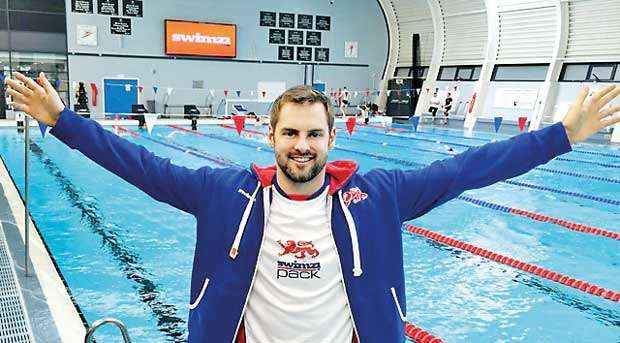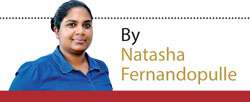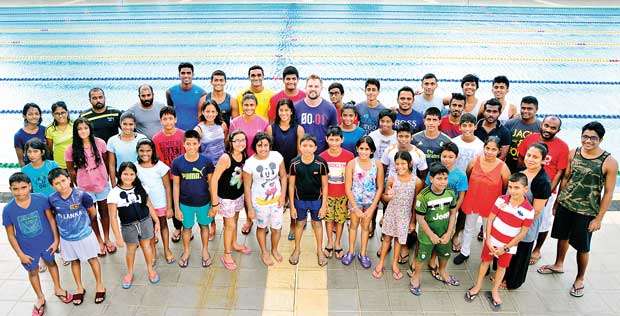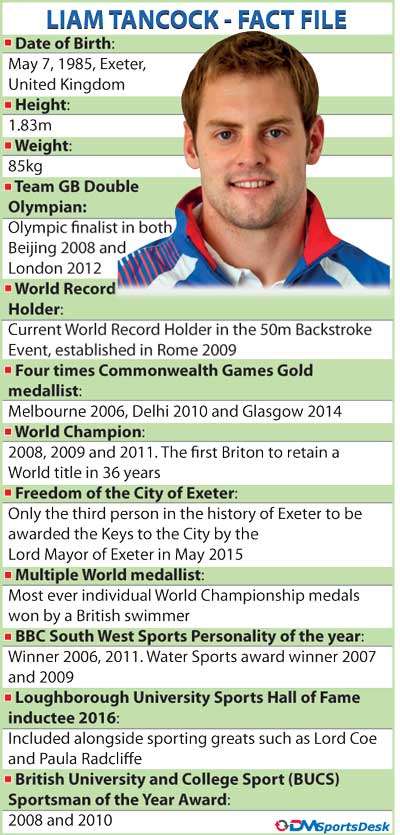Reply To:
Name - Reply Comment


 Olympian, World Champion and the current World Record Holder in the 50 Metre Back Stroke, Liam Tancock was in Sri Lanka in June to conduct a five-day swimming camp which was open to all schools and swimming coaches around the island. The Daily Mirror had a chance to have a chat with him while he was half way through the swim camp and one of the highlights he noted was that it was fascinating to see the talent of our local swimmers while he felt this was the start of something great for the future of Sri Lanka swimming.
Olympian, World Champion and the current World Record Holder in the 50 Metre Back Stroke, Liam Tancock was in Sri Lanka in June to conduct a five-day swimming camp which was open to all schools and swimming coaches around the island. The Daily Mirror had a chance to have a chat with him while he was half way through the swim camp and one of the highlights he noted was that it was fascinating to see the talent of our local swimmers while he felt this was the start of something great for the future of Sri Lanka swimming.
I first began swimming for a couple of reasons. The first was for water safety. I live in Great Britain which is an island and I live in the south west of England in a place called Devon. Devon is surrounded by water be it the sea, the river, the lakes, the ponds, so my parents wanted me to be safe in water if I ever fell in so I could survive

When did you first dive into the discipline of swimming?
I first began swimming for a couple of reasons. The first was for water safety. I live in Great Britain which is an island and I live in the south west of England in a place called Devon. Devon is surrounded by water be it the sea, the river, the lakes, the ponds, so my parents wanted me to be safe in water if I ever fell in so I could survive. So I learned to swim when I was five years old.
The other reason was because I was asthmatic and there’s lots of research out there saying that swimming is really good for you if you are asthmatic.
So those were the two reasons and I’ve never looked back.
 From learning to swim for water safety how did it progress into competitive swimming?
From learning to swim for water safety how did it progress into competitive swimming?
As soon as I learned to swim I loved it – I loved being in the water. My older brother Ryan swam as well. He was two years older than me and went to the local swimming club where I was learning to swim and he’d already learned to swim, since I loved it I followed him to the Exeter City Swimming Club in Devon. There, I went into a swimming club programme where they’ve got different levels like anywhere in the world, and then it progressed until I was in the big pool. I then started doing competitions when I was around the age of eight, and I never looked back.
I represented Great Britain at a Junior International Level and at Senior International Level in 2005. I was 20 at the time and it was at the Montreal World Championships in Canada (2005).

|
Liam Tancock and Conrad during the camp |
When did you first represent Great Britain?
I represented Great Britain at a Junior International Level and at Senior International Level in 2005. I was 20 at the time and it was at the Montreal World Championships in Canada (2005).

What was your earliest achievement in terms of medals?
It was during my first major competition in 2005 which was my first Senior International for Great Britain where I won a Bronze in the 50 Metre Back Stroke.

What have your other noteworthy achievements been since then?
It’s been fantastic to have represented Great Britain for such a long period of time. I competed in 2005 and in 2006 I took part in the Commonwealth Games in Melbourne.
In 2007 I won two bronze medals in the 100M back stroke and the 50M back stroke at the World Championships. In 2008 I represented Team GB in the Olympics in both the 100M Backstroke and the 200M Medley as well as the 4x100M Medley Relay – I didn’t achieve a medal but it was an amazing experience and I made finals in all three events.
At the 2008 World Short Course Championships I won the 100M Back Stroke – this was when it was in Manchester and in 2009 I became World Champion in the 50M Back Stroke Long Course.
In 2010 I won Gold Medals in the Commonwealth Games in Delhi, India and in 2011 I became the first man in 38 years in Great Britain to retain a world title when I retained the 50M Back Stroke. In 2009 I actually broke the record at the same time, with a time of 24.04, which was an amazing experience for me and I still hold that record today. So it’s been a pretty cool career with lots of medals at the highest level.
London 2012 was pretty special being the home Olympics.
So I’ve been to two Olympic Games – I haven’t won an Olympic medal but I made finals in all my events with such fine margins.

Why did you retire from competitive swimming?
I retired for a few reasons. You see, swimming is seen as quite a young sport but it’s getting older – 10 to 15 years ago if you were 21 you were considered an old swimmer and an old swimmer now would be in their late 20’s. I retired at 31 so I was trying to push the boundaries.
I think with the support and the network of coaches and scientists as well as money in the sport and sponsorships, I feel that it’s going to increase the ability for people to go on longer but I got to a stage where my body couldn’t take the training anymore and I got injured and it was time to call it a day.
People are dreaming for big things within the sport and this is the start of something big as it enables that process where it’s given the swimmers key pieces of information which helped me achieve great heights in the sport and I have the chance to give those swimmers those key points at a stage where they are like sponges taking it all in

How did you get involved in swim training programmes?
I did some clinics (master classes) and I’ve been lucky enough to have been invited all over the world to conduct training camps – I worked with the Olympic Swim Team in Canada after Rio. I tied up with Ceylon Tours with the help of Tracy (Francis) and it’s been a really good vibe. So I’ve been lucky enough to travel the world giving back and helping people achieve their dreams like I did.

Take us through the swim clinics you’ve been conducting here and how it came about
It all started with a phone call from Tracy. She had a vision where she wanted to bring elite level swimming over to Sri Lanka – obviously you’ve had some great swimmers in the past – Conrad (Francis) being one of them who is now an elite level coach and is on the programme here with me and it’s really good to have the likes of him involved.
Between Tracy, Ceylon Tours and me, we developed a programme where we could engage with the local community here in Colombo and Sri Lanka and we’ve got some Commonwealth Games swimmers from the Maldives as well.
People are dreaming for big things within the sport and this is the start of something big as it enables that process where it’s given the swimmers key pieces of information which helped me achieve great heights in the sport and I have the chance to give those swimmers those key points at a stage where they are like sponges taking it all in.
I’ve also been working with the coaches to develop their skills as shared learning is really important for me while getting the parents involved is vital. We’ve been doing pool sessions and classroom sessions and swimmers, coaches and parents have got the ability to ask questions and get involved in everything we do which is really important for me.

The swimmers on the last day of the camp

Do you have any other training planned for the year?
Yes, my next one’s back in the UK and there’s always lots coming on and lots of countries have been in touch as well. It’s quite exciting!

Do you think Sri Lankan swimming has potential?
I think the passion is certainly there between the athletes, coaches and parents which is really important because you need that combination and from what I’m seeing they are really engaged and they seem like they are really enjoying the sport. They’ve also been asking good questions so I think the future’s bright. It is potentially the start of something really big and I think it is an exciting time for them.

Where do you think Sri Lanka needs to improve?
If I looked at any country I’d say every country has got the ability to improve. Great Britain certainly has, America certainly has, Germany has, Japan has, and they’re the top of the tree.
I would think if you don’t think you’ve got anything to improve on then you just stay still so I think Sri Lankans are very open-minded as to what can be achieved. They’ve got big dreams and big ambitions and doing things like this can only help. I think if you think positively all areas can improve.
It’s fantastic that the Minister for Sport came to the press conference, he’s obviously passionate about improving sport in general in the country and was very welcoming of me and Ceylon Tours setting it up so that’s the first stage and when you’ve got the right people and the right passion you’re on target and I do believe this is the start of something good.
I think with the support and the network of coaches and scientists as well as money in the sport and sponsorships, I feel that it’s going to increase the ability for people to go on longer but I got to a stage where my body couldn’t take the training anymore and I got injured and it was time to call it a day

Do you think you’d come back for any programmes here and why?
I’d love to. I’ve really enjoyed the process. This was a dream at the beginning as to how we could engage with people, work with the right people and sponsors to help it happen and the team have wo rked their magic and I don’t see why this shouldn’t be a regular occurrence. I think for me sport in general is so engaging and I think it is really nice to see Sri Lanka getting behind it, the papers getting behind it, the sponsors allowing things to happen. Obviously you’re mad for cricket which is fantastic but I think it is really nice that we are seeing other sports develop and have that passion too and one thing I would love to see is whatever the big sport is (in whichever country), they’ve got the attention of the media, the sponsors and world really. I’ve seen it here where some of the cricketers have been interested in what we’re doing and it only takes a few of those guys to say, “This is great” for people to listen. I think we are starting to see that other sports personalities are engaged with not just their own sports but all sports and as an athlete I was certainly one of those people where I’ve learned from different sports and people around me and that made me a better athlete. I am starting to see that in Sri Lanka as well, that shared learning, shared best practice and the best sports working with up and coming sports. After all, why shouldn’t we all help each other? My aim is to not give everyone the answer it’s to share what I’ve learned and allow them to discover that for themselves. The idea is to fit in what works that individual, for that coach, for that family and I think when you give people the tools that’s when they have the ability to place them in the right position because I’m not there to say this is how you should do it. I’m there to give them the information for them to take it and run with it and allow them to develop and evolve.
rked their magic and I don’t see why this shouldn’t be a regular occurrence. I think for me sport in general is so engaging and I think it is really nice to see Sri Lanka getting behind it, the papers getting behind it, the sponsors allowing things to happen. Obviously you’re mad for cricket which is fantastic but I think it is really nice that we are seeing other sports develop and have that passion too and one thing I would love to see is whatever the big sport is (in whichever country), they’ve got the attention of the media, the sponsors and world really. I’ve seen it here where some of the cricketers have been interested in what we’re doing and it only takes a few of those guys to say, “This is great” for people to listen. I think we are starting to see that other sports personalities are engaged with not just their own sports but all sports and as an athlete I was certainly one of those people where I’ve learned from different sports and people around me and that made me a better athlete. I am starting to see that in Sri Lanka as well, that shared learning, shared best practice and the best sports working with up and coming sports. After all, why shouldn’t we all help each other? My aim is to not give everyone the answer it’s to share what I’ve learned and allow them to discover that for themselves. The idea is to fit in what works that individual, for that coach, for that family and I think when you give people the tools that’s when they have the ability to place them in the right position because I’m not there to say this is how you should do it. I’m there to give them the information for them to take it and run with it and allow them to develop and evolve.

Do you find that the basis of learning to swim is as a skill and not to compete?
A 100%. I think swimming and the reason I learned to swim is a life skill. Sri Lanka is a stunning country. It is an island surrounded by water where most of its population lives a few miles from the sea and water. I learned to swim for safety and I think that’s important so I’d love to see every Sri Lankan be able to swim irrespective of whether they represent their country or not, they should be able to save themselves because it is a life skill. For me, it’s more important than any medal or world record.
Too many people around the world die of drowning and it is preventable – you’ve got to learn to swim. You don’t even need to swim with good technique – we’re talking about elite level swimmers – I’m talking about anyone and I know both LEN and FINA the European and the World governing bodies for swimming are really passionate about that as well so I think if that can filter down to different countries that would be great.
Pix courtesy Ceylon Tours